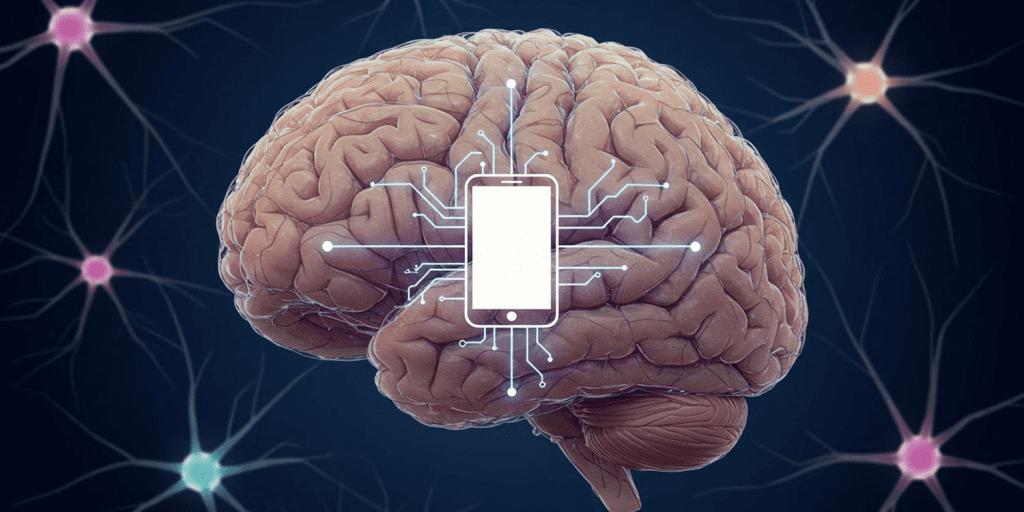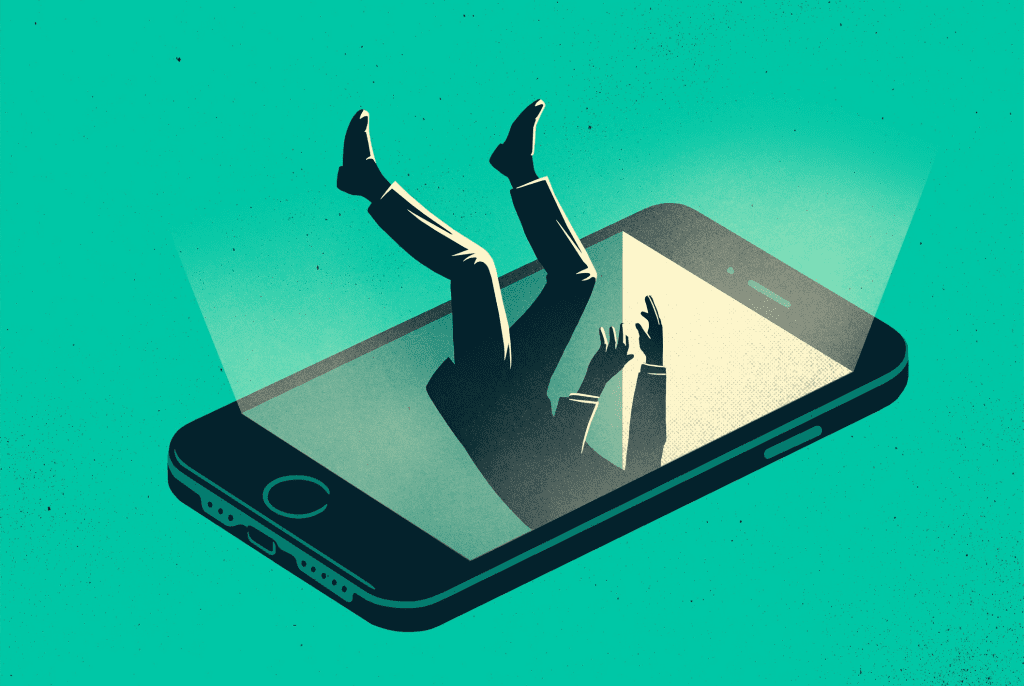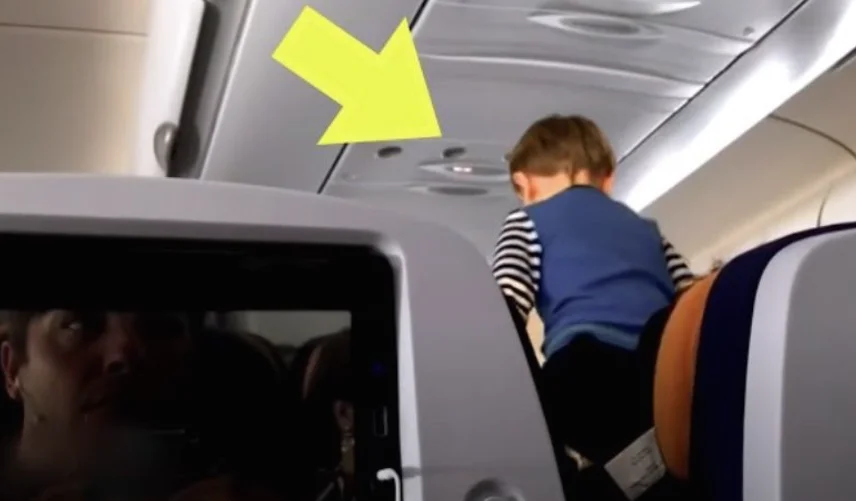Smartphones have become an inseparable part of modern life, revolutionizing communication, work, and entertainment. However, excessive smartphone use (ESU) has been linked to various negative consequences, including addiction-like behaviors, impaired mental health, and diminished attention spans. Recent studies suggest that smartphone-related cues can trigger neural responses similar to those seen in substance addiction, reinforcing compulsive usage patterns. Understanding the effects of smartphone restriction on cue-related neural activity can provide valuable insights into developing interventions for individuals struggling with ESU.
The Role of Cue Reactivity in Smartphone Use

Cue reactivity (CR) refers to the brain’s response to stimuli associated with a habitual or addictive behavior. In the case of smartphone use, cues may include notification sounds, phone screens lighting up, or simply seeing a smartphone in one’s environment. These cues can activate reward-related brain regions, reinforcing the compulsive urge to check the device.
Research has shown that individuals with excessive smartphone use exhibit heightened neural responses to smartphone-related cues, similar to those observed in substance addiction. This heightened sensitivity may contribute to difficulty in controlling smartphone usage, leading to a cycle of compulsive checking and craving.
Investigating Neural Activity Changes Through Smartphone Restriction
To better understand how short-term smartphone restriction influences brain activity, researchers conducted a study using functional MRI (fMRI) to measure changes in cue-related neural responses over 72 hours of smartphone abstinence. The study involved 25 young adults who were regular smartphone users.
Video : What Happens To Your Brain When You Mindlessly Scroll?
Study Design and Methods
- Participants were instructed to refrain from using their smartphones for 72 hours.
- A cue-reactivity task was designed, where participants were exposed to images of smartphones (both active and inactive) as well as neutral objects.
- Functional MRI scans were conducted before and after the restriction period to analyze changes in brain activity.
- Psychometric assessments were used to measure craving, self-control, and emotional responses associated with smartphone use.
Key Findings: How the Brain Adapts to Smartphone Restriction
1. Reduced Activation in the Reward System
One of the most striking findings was a significant reduction in activity in the nucleus accumbens and anterior cingulate cortex after 72 hours of smartphone restriction. These brain regions are heavily involved in reward processing and habit formation.
- The nucleus accumbens is associated with motivation and reinforcement learning. High activation in this area suggests strong craving and compulsive behavior.
- The anterior cingulate cortex plays a role in decision-making and impulse control. Reduced activity here indicates that participants may have experienced less compulsion to check their smartphones.
These findings suggest that even a short break from smartphone use can lead to neuroplasticity, allowing the brain to become less reactive to smartphone-related cues.
2. Alterations in Dopamine and Serotonin-Linked Activity
Further analysis using neurotransmitter probability maps revealed that activity changes in the reward system were closely linked to dopamine and serotonin receptor probabilities.
- Dopamine is a key neurotransmitter in reward-seeking behavior and addiction.
- Serotonin is involved in mood regulation and impulse control.
The findings suggest that smartphone restriction may influence neurochemical processes that drive compulsive behaviors. This could explain why some people feel withdrawal-like symptoms, including restlessness and anxiety, when they suddenly stop using their phones.

3. Increased Engagement of the Parietal Cortex
Another notable result was the increased activity in the parietal cortex, a region associated with attentional control and sensory processing.
- This suggests that participants became more aware of their environment and less preoccupied with smartphone-related distractions.
- Heightened parietal cortex activity was correlated with reduced craving scores, indicating improved cognitive control over impulsive smartphone use.
This supports the idea that limiting smartphone use can enhance focus and attentional regulation, reducing dependency on digital devices.
4. Reduced Compulsive Checking Behavior
Behavioral assessments showed that participants experienced a significant decrease in the urge to check their smartphones over time. This aligns with the observed neural changes in reward sensitivity and impulse control.
Participants also reported improvements in:
- Sleep quality: Reduced exposure to blue light and nighttime scrolling led to better sleep patterns.
- Social interactions: Without constant phone distractions, participants engaged more with people around them.
- Mental well-being: Several individuals noted feeling less anxious and more present in their daily activities.
Implications for Smartphone Addiction and Digital Detox Strategies

The findings of this study have significant implications for individuals struggling with excessive smartphone use. While a complete break from smartphones may not be feasible for everyone, implementing digital detox strategies can help manage usage and mitigate negative effects.
1. Scheduled Smartphone Breaks
- Taking regular breaks from smartphone use, even for a few hours a day, can help reset neural responses to digital cues.
- Setting specific times for checking messages rather than responding to every notification can reduce compulsive checking.
2. Mindful Technology Use
- Practicing conscious smartphone use by turning off unnecessary notifications and using grayscale mode can help decrease reliance on digital stimuli.
- Engaging in non-digital hobbies, such as reading, exercise, or meditation, can strengthen attention control and reduce smartphone dependency.
3. Sleep Hygiene and Nighttime Restrictions
- Avoiding smartphone use one hour before bed can improve sleep quality by preventing blue light exposure.
- Using do not disturb or airplane mode at night can minimize the temptation to check notifications.
4. Awareness Campaigns and Education
- Schools, workplaces, and mental health professionals can promote awareness of the impact of excessive smartphone use on brain function.
- Implementing digital wellness programs can encourage balanced technology use.
Video : Cell Phones Affect Brain Activity

Conclusion: How Smartphone Restriction Reshapes the Brain
The study provides compelling evidence that even a short period of smartphone restriction can lead to measurable changes in brain activity. The observed reductions in reward-related neural responses, coupled with increased attentional control, suggest that limiting smartphone use can promote cognitive flexibility, impulse control, and overall mental well-being.
As smartphone addiction continues to be a growing concern, understanding the neurological basis of cue-reactivity and digital dependency is crucial. These findings highlight the importance of incorporating healthy technology habits to ensure that smartphones remain tools for convenience rather than sources of compulsive behavior.
By making small adjustments in smartphone usage, individuals can foster better focus, improved mental clarity, and greater overall life satisfaction. So, why not start with a 72-hour break and see how your brain adapts?
Flight Attendant Hears Sobbing from Lavatory, Discovers Child Not Listed on Passenger Manifest

A strange noise from the bathroom during a flight leaves flight attendant Leslie feeling scared. Unbeknownst to her, the child inside will change her life forever.
Leslie felt a headache from a night of partying as she headed to her plane. When she spotted her colleague Amy, she asked for headache pills. Amy rolled her eyes, reminding Leslie that partying before a long flight was unwise. Leslie sighed, thinking that partying was a better distraction than visiting museums.
As they prepared for the passengers, Leslie took her pills, hoping to rest in the crew quarters. However, a peculiar sound caught her attention. She hesitated, then dismissed it as her imagination. But when she heard a high-pitched cry, she realized it was a child. When Amy knocked on the bathroom door without a response, she opened it and screamed. Inside was a young boy named Ben, who looked up at Leslie with tears in his eyes.
Leslie crouched down to talk to him and learned that he was lost and afraid. He was clutching a bag and sobbing about his grandmother’s medicine, saying it was his fault if she didn’t get it. Ben explained that he had gotten separated from his family at the airport and accidentally boarded the wrong plane.
Leslie felt a surge of compassion for the boy and decided to help him. She alerted the authorities upon landing in Los Angeles, but was shocked when she found out she had to stay with Ben instead of going out. Her plans to explore L.A. were put on hold as she took care of him.
As they shared pizza for dinner, Leslie received a call from her mother. Her son, Joe, was sick, and they had to see a specialist. Hearing this news crushed her, filling her with worry and guilt for not being there.
Ben approached her, offering her the bag of medicine, saying he wanted to help Joe. Overwhelmed by his kindness, Leslie resolved to get Ben to his grandmother in Seattle and then return home to Joe. She booked a ticket for Ben at her own expense and prepared to fly with him.
On the flight to Seattle, Ben expressed his fears that he might have harmed his grandmother. Leslie reassured him that his mother loved him and would be happy to see him safe. When they arrived, Ben’s family greeted him with hugs and relief. In contrast, Leslie’s reunion with Joe was heartbreaking. He looked frail, and she felt helpless. Despite her exhaustion, she vowed to do everything possible to help him.
Days passed, and Joe’s condition worsened. The doctors couldn’t find a solution, and Leslie struggled financially, as the airline wouldn’t pay for her time off to care for him. One day, a knock on the door revealed Ben and his family, who handed Leslie an envelope containing a check for over a hundred thousand dollars. They explained that they had started a crowdfunding campaign for Ben’s grandmother’s treatment, but she had passed away. They decided to give Leslie the money for Joe’s care.
Tears filled Leslie’s eyes as she expressed her gratitude, overwhelmed by their generosity. Ben promised to return one day to play with Joe. Eventually, Joe recovered and returned to his playful self, all thanks to Ben’s family. As Leslie watched him outside, she realized how far they had come.
Before returning to work, she contacted Ben’s family to offer them lifetime flight discounts as a token of her appreciation for their kindness. The story illustrates that children need attention and love, as Ben acted out in his desperation for his mother’s affection. It also shows that avoiding emotional pain through distractions isn’t a solution; finding healthier ways to cope is essential.



Leave a Reply